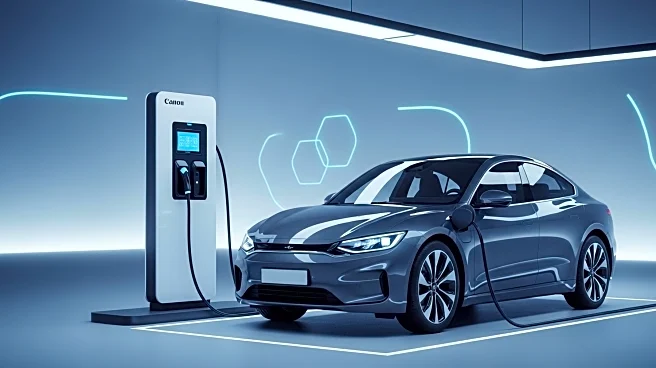What is the story about?
What's Happening?
Consumer Reports has released data indicating that electric vehicles (EVs) are currently less reliable than their gas-powered counterparts. The report highlights that EVs have experienced 42% more problems compared to gas-powered vehicles over the past three years. This marks an improvement from previous years but still suggests that EVs require further optimization. The reliability issues are primarily attributed to the electric powertrain, which includes components such as the engine, transmission, and drive shafts. Unlike traditional vehicles, EVs rely solely on electricity from batteries, which can lead to unique challenges. Despite these reliability concerns, EVs are considered a crucial step towards reducing fossil fuel dependency.
Why It's Important?
The reliability of electric vehicles is a significant factor in their adoption and cost efficiency. As EVs are positioned as a sustainable alternative to gas-powered vehicles, their reliability directly impacts consumer confidence and market growth. The reported issues could deter potential buyers, affecting the transition to cleaner transportation options. However, the improvement in reliability over the past year suggests progress in addressing these challenges. The automotive industry, policymakers, and environmental advocates are closely monitoring these developments, as increased EV adoption is vital for achieving climate goals and reducing carbon emissions.
What's Next?
The automotive industry is expected to continue investing in research and development to enhance the reliability of electric vehicles. Manufacturers may focus on improving battery technology and powertrain components to reduce the frequency of issues. Consumer Reports' findings could influence consumer purchasing decisions, prompting manufacturers to prioritize reliability in their marketing strategies. Additionally, government incentives and policies supporting EV adoption may play a role in accelerating improvements in reliability. Stakeholders will likely engage in discussions on how to balance the push for EV adoption with the need for reliable performance.
Beyond the Headlines
The reliability challenges faced by electric vehicles highlight broader implications for the automotive industry and environmental policy. As EVs become more prevalent, the demand for specialized parts and maintenance services may increase, potentially creating new business opportunities. Furthermore, the focus on improving EV reliability could drive innovation in battery technology and energy management systems, contributing to advancements in other sectors such as renewable energy and smart grid solutions. The transition to electric vehicles also raises ethical considerations regarding the sourcing of materials for batteries and the environmental impact of production processes.

















